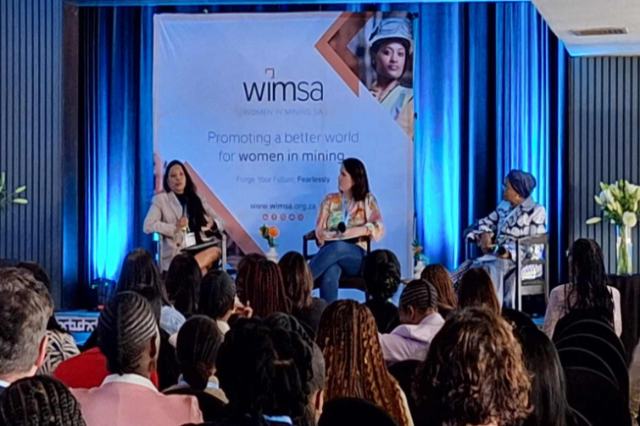Cape Town — Despite women having come a long way in the mining sector, the industry is still unprepared in terms of integrating them and supporting them in the workplace, delegates heard at the recent Women in Mining South Africa (WiMSA) Inaugural Symposium in Randburg.
As reported by Mining Review, WiMSA board chairperson Noleen Pauls opened the symposium by pointing out the industry’s slow progress in addressing the unique challenges faced by women.
“We’ve come a long way from when women couldn’t work underground in South Africa, but we’re still talking about the same issues. This conference aims to change that by focusing on real solutions” she said.
“WiMSA has grown from a concept in 2010 to a central organisation in the South African mining industry. We’re proud to be recognised by both the Department of Mineral Resources and Energy and mainstream media. This event wouldn’t be possible without the dedication of our team and the incredible support from our sponsors and media partners,” she said.
Today, we attended the highly anticipated @WomenInMiningSA symposium, where influential speakers and experts gathered to shape the future of #womeninmining.
The event provided a unique opportunity to gain insights, network, & engage in thought-provoking discussions.#MI25 #wimsa pic.twitter.com/S5RYrDbwbA— Mining Indaba (@MiningIndaba) August 20, 2024
Keynote speaker Nompumeleo Obokoh, CEO of the South African Council for Natural Scientific Professions, echoed this concern. She highlighted how the mining industry’s infrastructure, policies and cultural norms are still largely unsuited to women.
“From the streets of Pretoria in 1956 to the boardrooms and mine shafts of today, our history is rich with examples of women who refused to be silenced. We are challenging the status quo, driving change and creating a more inclusive industry – one that is gender-sensitive and transformative” Obokho said.
“In this journey, solidarity is key. We must lift each other up, create spaces where our voices are heard and mentor the next generation of women in industry. By nurturing young girls’ interest in STEM [science, technology, engineering and maths] from an early age, we prepare them for future opportunities, ensuring that as a country, we move forward together,” she said.
The symposium’s panels addressed various aspects of the state of the sector’s preparedness. Women of Sibanye-Stillwater project manager Fatima Collins moderated a discussion on gender-based violence, where panellists underscored the insufficiency of the industry’s protective measures. The Special Director of Public Prosecutions for Sexual Offences, Advocate Bonnie Currie-Gamwo, pointed out that the increase in women employees has exposed the sector’s lack of readiness, leading to problems like stereotyping and violence. She advocated for enhanced support systems such as Thuthuzela Care Centres.
Dr Obokoh, CEO of SACNASP, captured the spirit of Imbokodo – Wa Thinta Abafazi, Wa Thinta Imbokodo! at the Women in Science South Africa (WiMSA) symposium – reminding us that despite the challenges in a male-dominated industry, women are the unbreakable forces shaping the future pic.twitter.com/woVxGVfnWz
— Matshidiso Matabane (@Bailekae24) August 20, 2024
Lindokuhle Zwane, the Gender-Based Violence and Femicide (GBVF) project co-ordinator at the Minerals Council South Africa, said: “The need for Thuthuzela Care Centres is undeniable, especially with the rising statistics of gender-based violence. Member companies of the Minerals Council have pledged support, from providing comfort packs to ensuring that survivors receive quality services. It’s not about reinventing the wheel, but about refining the systems we have in place to truly align with the needs of survivors.”
“The Minerals Council member companies are committed to supporting Thuthuzela Care Centres beyond their areas of operation. This goes hand in hand with accountability – ensuring that people know what the centres do so that victims can hold the system accountable if their needs aren’t met,” Zwane said.
Mathlatsi Nthoro, a senior associate at law firm Webber Wentzel, said it was the responsibility of the employer to protect employees, especially in male-dominated environments that are shifting into accommodating more women.
“You can’t encourage women into your spaces and then fail to protect them. It’s crucial that companies be seen as active advocates against gender-based violence by having policies in place that provide clear reporting mechanisms and support for survivors” she said.
Follow African Insider on Facebook, Twitter and Instagram
Picture: X/@MiningIndaba
For more African news, visit Africaninsider.com
Compiled by Lauren Petersen


